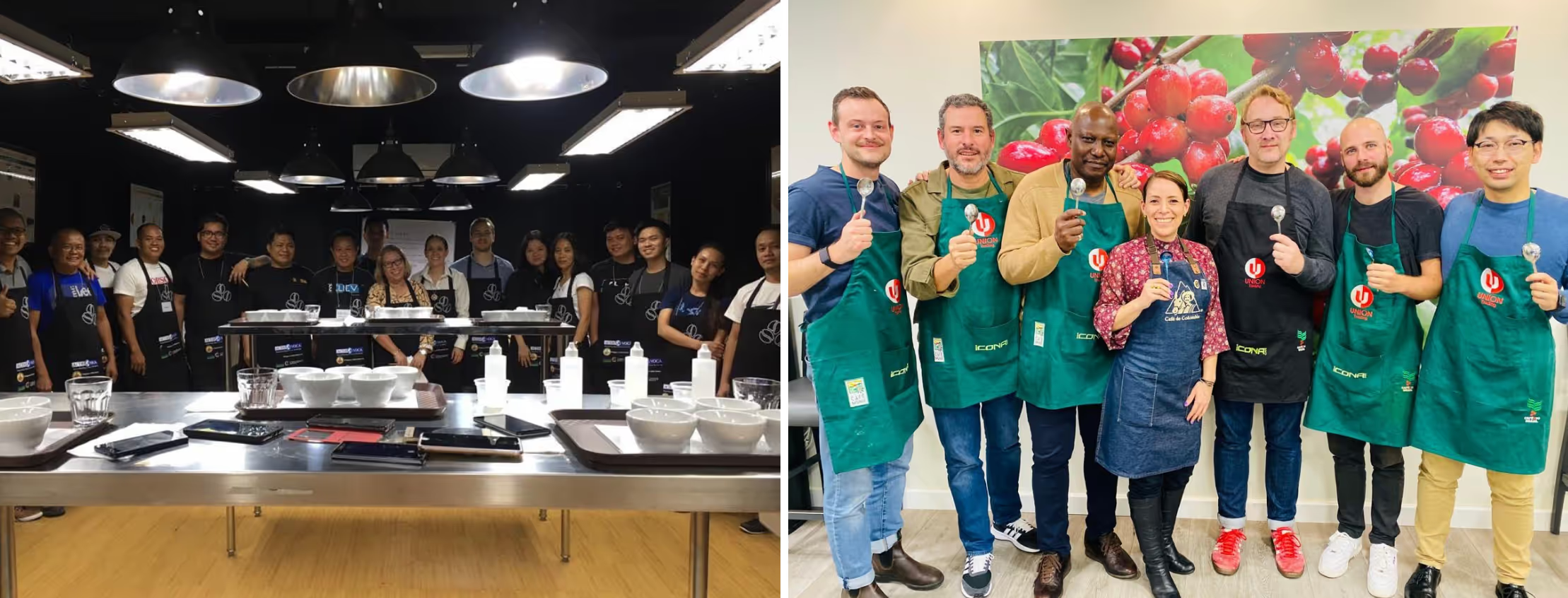
"لم تكن رحلتي في تعليم القهوة خطية ولا مخطط لها. لقد نادتني القهوة، وهي الآن من أهم الأشياء في حياتي". تتسم مسيرة لوز ستيلا أرتاخو المهنية التي امتدت لعقد من الزمن كمعلمة في صناعة القهوة بالتفاني والشغف. ولأكثر من عشر سنوات، عملت لأكثر من عشر سنوات كمدربة محترمة في معهد جودة القهوة (CQI)، مما كان له تأثير كبير على مجتمع القهوة العالمي. وُلدت لوز ونشأت في كولومبيا، وانضمت إلى معهد جودة القهوة في عام 2014 كمدربة في معهد جودة القهوة في عام 2014 كمدربة في قهوة أرابيكا. وعلى مر السنين، وسّعت دورها على مر السنين، وحصلت على العديد من الدرجات مثل مدرّبة معالجة Q المستوى 1 في عام 2018 ومدرّبة مساعدة لمعالجة Q المستوى 2 في عام 2019. وطوال مسيرتها المهنية، قامت بتدريس وإلهام الطلاب في أكثر من 22 دولة، مما ساهم بشكل كبير في تعليم القهوة في جميع أنحاء العالم.
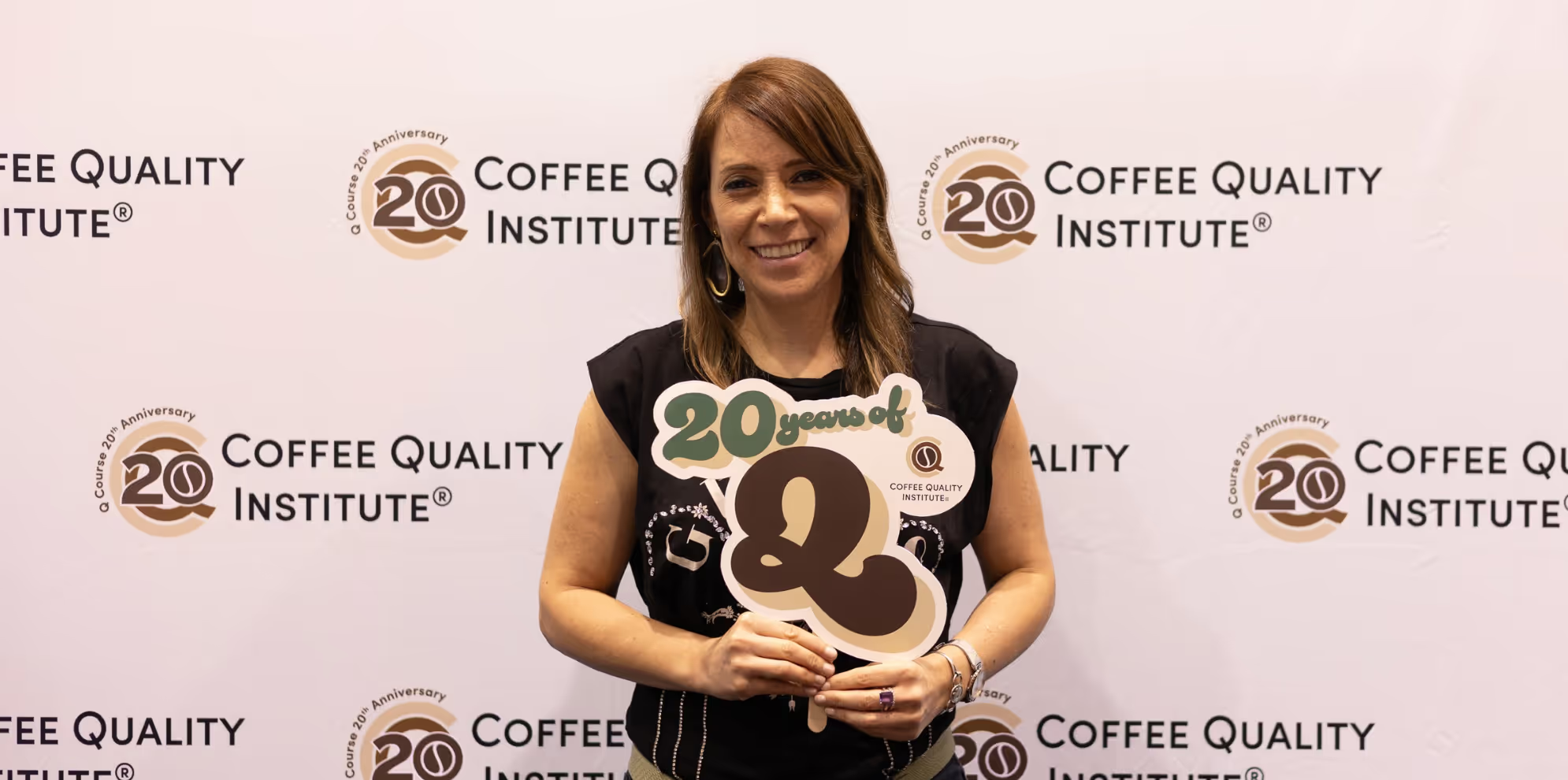
من الأوساط الأكاديمية إلى القهوة
عندما سُئلت لوز عن خلفيتها التعليمية، ابتسمت ابتسامة صغيرة وضحكت قائلة: "لقد كانت قصة مثيرة للاهتمام". درست لوز هندسة الأغذية في الجامعة وحصلت فيما بعد على درجة الدكتوراه في علوم الأغذية. في ذلك الوقت، لم يكن لها علاقة تذكر بالقهوة. واتخذت رحلتها منعطفاً عندما عادت إلى كولومبيا بعد حصولها على درجة الدكتوراه. في عام 2008، تم تعيينها كمدققة حسابات في شركة Cup of Excellence، والتي أصبحت نقطة دخولها إلى عالم القهوة. عملت كمدققة حسابات لمدة ثلاث سنوات متتالية، مما أثار اهتمامها بهذا المجال وحفزها على تعلم المزيد.
تقول لوز: "بعد أن أصبحت مدققة في منظمة Cup of Excellence، واصلت التعلم عن القهوة، وأخذت دروساً في هذا المجال، وشاركت في مشاريع، وانضممت إلى فعاليات". في عام 2016، حصلت على درجة الماجستير في اقتصاديات القهوة وعلومها من شركة Illy في إيطاليا. كما أكملت دراستها للحصول على درجة الماجستير الثانية في الأعمال التجارية الدولية في برشلونة، وأكملت دورات ما بعد الحصاد في معالجة ما بعد الحصاد QP1 وQP2 وQP3 مع معهد CQI. "كانت هذه هي الخطوات الأولية التي أدت إلى انخراطي العميق في معهد CQI وتعليم القهوة. وعلى الرغم من أنني لم أدرس التعليم بشكل رسمي، إلا أنني لطالما كان لدي شغف قوي بالتعليم. تسمح لي خلفيتي الأكاديمية بدمج كل ما تعلمته في تدريسي، وهو ما أعتقد أنه منحني ميزة فريدة من نوعها."
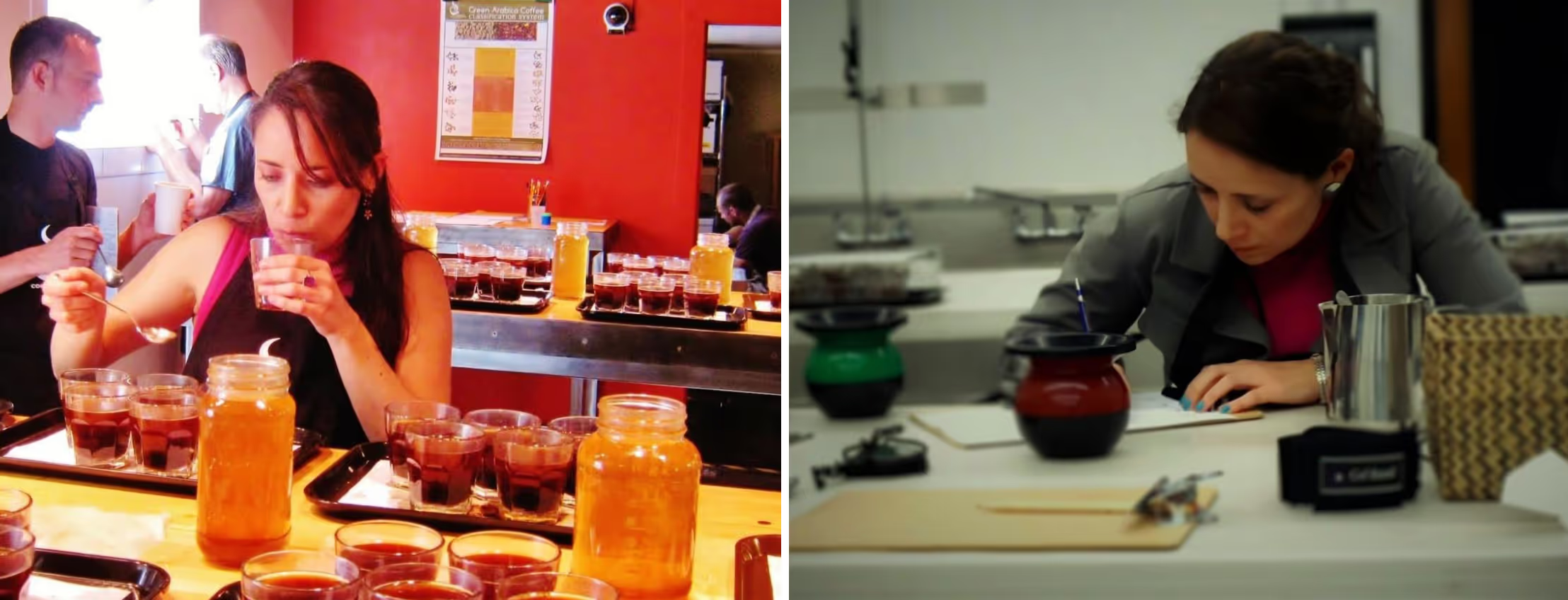
التجربة الأولى كمدرب في مبادرة الجودة الشاملة
كانت أول تجربة للوز كمدربة في مبادرة الجودة الشاملة في ميانمار، حيث أجرت أول دورة تدريبية لها في مجال الكيو غريدر أرابيكا. شكلت هذه اللحظة المحورية بداية رحلتها التعليمية المتنوعة. وفي معرض حديثها عن هذه اللحظة، تقول لوز: "لقد علمني تدريس أول دورة تدريبية لي في برنامج Q Grader حافية القدمين في معمل قهوة محلي أهمية التكيف الثقافي. فبالإضافة إلى المحتوى التقني، يعد التكيف مع الناس والأماكن والثقافات أمرًا بالغ الأهمية لتحقيق النتائج المرجوة كمدربة". حددت هذه التجربة أسلوبها في التدريس وأعدتها لمجتمع القهوة متعدد الثقافات الذي ستتعامل معه في السنوات القادمة.
أكدت هذه التجارب المبكرة على أهمية الحساسية الثقافية والقدرة على التكيف، والتي أصبحت حجر الزاوية في فلسفتها في التدريس. "كمدرّسة، يجب على المرء أن يكيّف أساليب التدريس لاستيعاب الأجيال المختلفة في نفس الصف. لقد أثرت تجربتي في ميانمار تأثيراً عميقاً على طريقة إدارتي للدورات التي أقدمها في جميع أنحاء العالم. لقد فتحت منظوري وشكلت لحظة محورية في مسيرتي المهنية في التدريس."
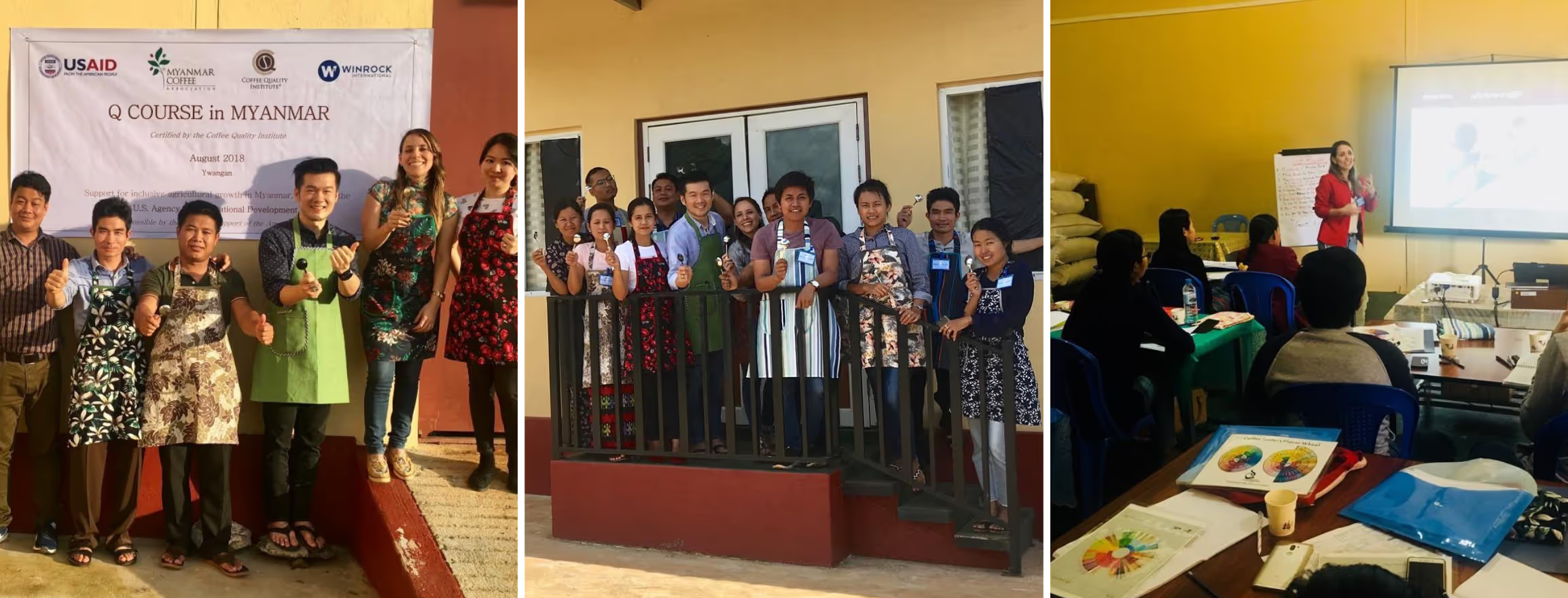
الدروس المستفادة في بوروندي
تحتل بوروندي مكانة خاصة في قلب لوز بسبب التحديات الكبيرة التي واجهتها هناك. "كانت تلك هي المرة الأولى التي أجري فيها دورة ما قبل التعليم الأساسي بأقل قدر من الموارد. وقد تطلب الأمر تكيفاً كبيراً وأثر بشكل إيجابي على مسيرتي المهنية كمعلمة". تسلط هذه التجارب الضوء على مرونتها وتفانيها في نقل تعليم القهوة في ظل ظروف متنوعة.
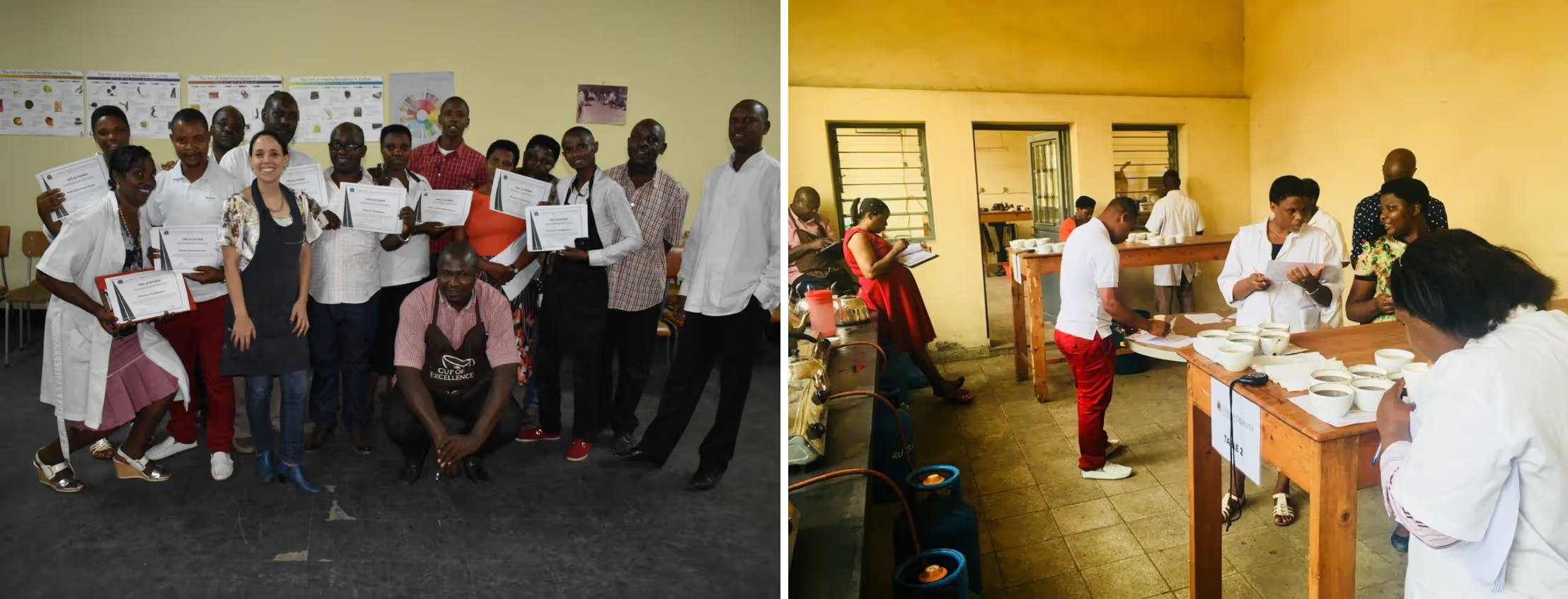
المهارة المفضلة للتدريس؟
عند سؤالها عن الجزء المفضل لديها في التدريس، تجد لوز صعوبة في اختيار جزء واحد فقط. "إذا كان عليّ أن أختار مجالاً واحداً فقط أستمتع بتدريسه أكثر من غيره، فسيكون حجامة القهوة وتعليم بروتوكولات الحجامة."
"إن مشاهدة عملية الحجامة لكل شخص تتطور، ورؤية طلابي يتبعون ترتيباً محدداً، وتحقيق التزامن في العملية أمر يبعث على السرور الشديد. إنه جهد عمل جماعي كبير يُحدث فرقاً إيجابياً في الديناميكية العامة لكل دورة تدريبية."
هل من نصائح للمعلمين الجدد؟
تقدم لوز نصائح عملية للمعلمين الطموحين في صناعة القهوة. "يجب أن يتمتع المعلم بالمعرفة العميقة والالتزام بالتعلم المستمر. بالنسبة لي، هناك أربعة عناصر أساسية لكي تكون معلمًا ناجحًا في هذا المجال: 1) المعرفة، 2) القدرة على نقلها، 3) الدعوة، 4) الشغف. التميز هو المفتاح لإحداث تأثير حقيقي." وتشدد أيضًا على أهمية التعاطف والرغبة في التحسين المستمر، وكلاهما ضروريان للتدريس الفعال ومشاركة الطلاب.
ما أكثر ما يعجبك في مبادرة الجودة الشاملة؟
"بصفتي مدربًا، أؤكد دائمًا على مصداقية نظام مبادرة الجودة الشاملة. إن ما ميز مبادرة الجودة الشاملة عن غيرها من المنظمات الأخرى هو مصداقية البرنامج على مدى سنوات عديدة. وقد ضمنت صرامة النظام دقة النظام في توفير التعليم الرسمي للعالم." إن نظام مبادرة الجودة الشاملة منظم بشكل جيد، مع وجود مبادئ توجيهية واضحة، وتتبع جميع العروض التقديمية ترتيبًا ومنهجًا متسقًا، مما يضمن تحقيق جميع الأهداف من قبل كل مدرب. وهذا، بالإضافة إلى "الدعم الفني الدقيق والصارم والصارم والدقيق" هو ما يجعل معهد CQI ممتازًا في رأي لوز.
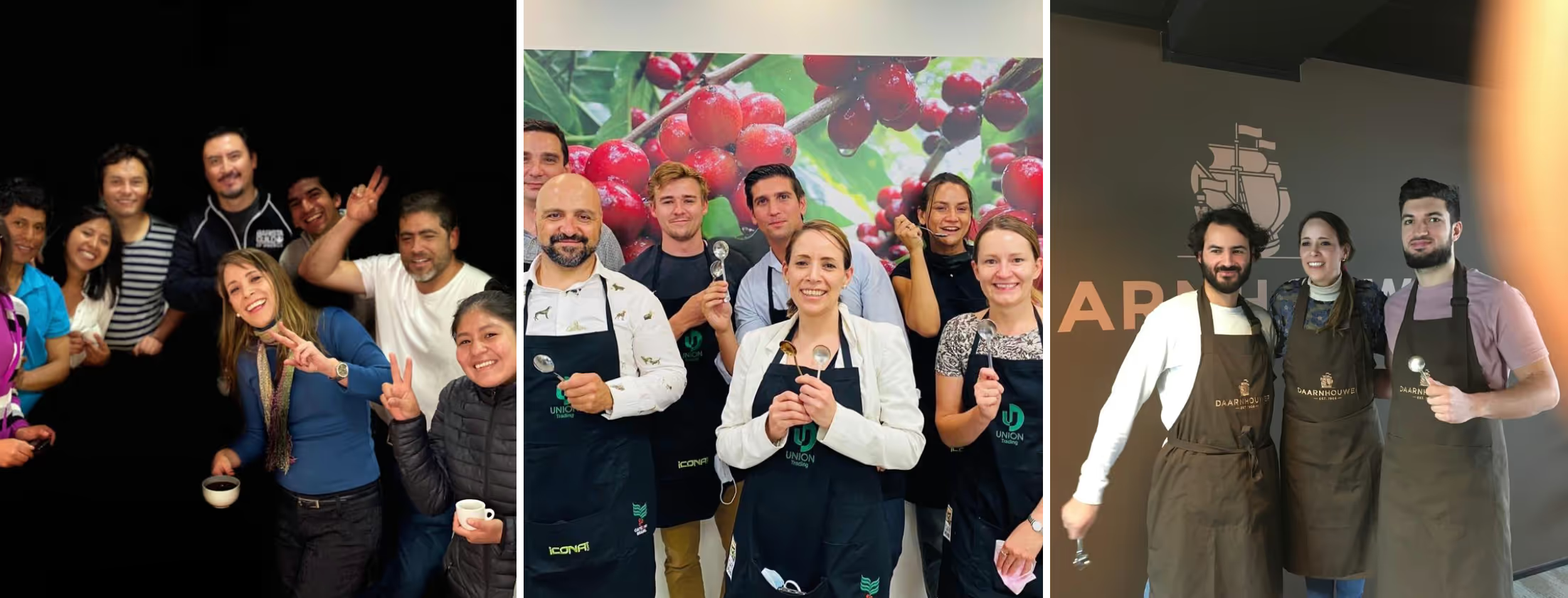
إرث من التعلم
"يتمتع المعلمون بالقدرة على التأثير بعمق على طلابهم ومجتمع القهوة الأوسع نطاقاً. وهدفي هو الاستمرار في إحداث هذا التأثير." يمتد التزام لوز بتعليم القهوة إلى ما وراء الحدود، وقد شكلته تجاربها عبر القارات. لقد أثرت رحلتها مسيرتها المهنية وصاغتها لتصبح معلمة حنون وفعالة في مجال جودة القهوة. ومع استمرارها في مشاركة شغفها ومعرفتها، سيستمر إرث لوز من القدرة على التكيف والمعرفة والتفاني في إلهام الجيل القادم من محترفي القهوة. وهي تهدف في المستقبل إلى توسيع نطاق تأثيرها والابتكار في طرق التدريس وتعزيز النمو داخل مجتمع القهوة العالمي.
